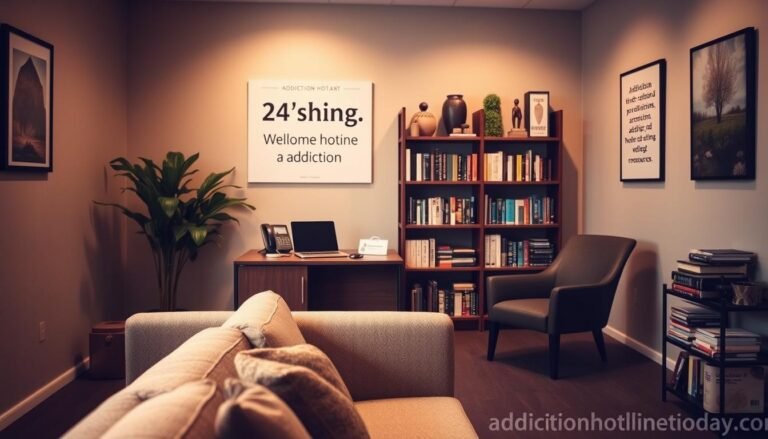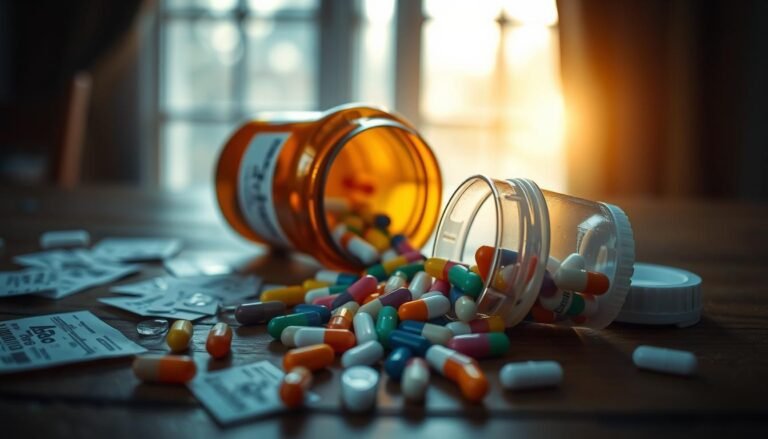Drug Addiction and Suicide: Breaking Free & Finding Hope
Have you ever thought about how drug addiction and suicide are linked? This connection is complex but very important to grasp. As we explore this topic, a key question arises: How can those struggling with addiction find a way out and hope for a better tomorrow?
Key Takeaways
- Addiction and suicide are closely intertwined, with substance abuse significantly increasing the risk of suicide.
- Mental health disorders often contribute to addiction, highlighting the importance of complete treatment.
- The path to recovery involves tackling both addiction and mental health issues at the same time.
- With the right support and treatment, people can overcome addiction and look forward to a brighter future.
- It’s vital to understand the complex link between drug addiction and suicide to prevent and treat these issues effectively.
Understanding the Complex Nature of Addiction and Mental Health
Addiction and mental health disorders often go together. About 9.2 million adults in the United States have both. It’s important to understand this connection for better treatment and prevention.
The Role of Brain Chemistry in Addiction
Substance abuse changes brain chemistry. It affects neurotransmitters like dopamine and serotonin. These chemicals help control mood, behavior, and thinking. This change can lead to a cycle of addiction and mental health issues.
Mental Health Disorders and Substance Abuse
People with mental health problems, like depression or anxiety, are more likely to abuse substances. They might use drugs or alcohol to feel better. Sadly, those with substance use disorders are six times more likely to attempt suicide, says the National Institute on Drug Abuse (NIDA).
Environmental and Genetic Factors
Genetics and environment also play a part. Stress, trauma, and other bad experiences can raise the risk of addiction and mental health issues. Some people might be more likely to develop these problems because of their genes.
It’s key to understand addiction and mental health to help people recover. By looking at brain chemistry, mental health, and other factors, healthcare can offer a full support plan. This helps individuals on their journey to recovery and well-being.
Drug Addiction and Suicide: A Deadly Connection
There’s a clear link between drug addiction and suicide. Substance abuse greatly increases the risk of suicidal thoughts and actions. People with both addiction and mental health issues face a very high risk of suicide.
Substance abuse can make people act impulsively and lose judgment. This makes them more likely to take their own lives. Alcohol and opioids are two substances that have been linked to a higher risk of suicide.
Cannabis use has also been tied to suicidal behaviors. Using multiple substances at once makes the risk even higher. Certain groups, like older adults and young people, are at a higher risk due to their substance use.
| Substance | Impact on Suicide Risk |
|---|---|
| Alcohol | Significant contributor to suicide, with substantial impact on suicide rates |
| Opioids | Strongly linked to suicide, with data supporting the correlation |
| Cannabis | Associated with suicidal behaviors |
| Polysubstance Use | Significantly increases the risk of suicide |
It’s important to understand the link between addiction and suicide. This knowledge helps us create better ways to prevent and treat these issues. By tackling substance abuse and mental health together, we can offer hope to those struggling.
“The intersection of mental health challenges, substance use disorders, and access to firearms aggravates suicide risks.”
Warning Signs and Risk Factors of Substance Abuse
It’s key to spot the signs of substance abuse early. This can stop bad things from happening. Look out for changes in behavior, physical signs, and emotional changes. Knowing these signs can help you support someone who needs help.
Behavioral Changes to Watch For
- Increased secrecy and evasiveness
- Mood swings and changes in personality
- Withdrawal from previously enjoyed activities
- Neglect of personal hygiene and appearance
Physical and Emotional Symptoms
- Disruptions in sleep patterns, such as insomnia or oversleeping
- Unexplained weight fluctuations
- Increased irritability, anxiety, or signs of depression
Social and Professional Impact
Substance abuse can really affect someone’s life. It can change how they act socially and at work. This includes:
- Social isolation and withdrawal from friends and family
- Difficulties at work, such as decreased productivity or job loss
- Academic decline or dropouts for students
Seeing these signs early can help stop things from getting worse. It’s a chance to help someone get better and move forward. Early action can make a big difference.
“Addiction is a disease, not a moral failing. We must approach it with compassion and evidence-based treatments, not judgment and stigma.”
Breaking the Chains of Addiction: First Steps to Recovery
Overcoming addiction and suicidal thoughts takes a lot of courage and support. The first steps are to admit the problem and get professional help. It’s important to remove the shame around addiction to help people start their journey.
Research shows that stopping drug or alcohol use can improve brain function and behavior quickly. Cognitive-behavioral therapy (CBT) helps change harmful thoughts and behaviors. Neurofeedback training also helps control brain activity and reduce substance use.
- Use mobile apps and online programs for addiction recovery to stay sober.
- Join support groups like Alcoholics Anonymous for support during recovery.
- Try healthy activities like exercise, meditation, or learning new skills to strengthen your brain and reduce cravings.
Having a strong support network is key for long-term recovery and preventing suicide. Family support is very important, as it helps patients stay in treatment and achieve better results. Family therapy can also lead to positive outcomes and healing.
Organizations like Lifeline Connections provide evidence-based care for those struggling with addiction and mental health issues. Al-Anon groups are also helpful for family members dealing with a loved one’s addiction.

The journey to recovery is tough, but with the right support and determination, it’s possible. By taking the first steps and seeking help, individuals can find hope and a brighter future.
The Impact of Substance Abuse on Mental Health
Substance abuse and mental health are closely linked. Many people with addiction also have mental health issues like depression, anxiety, and PTSD. It’s important to treat both conditions together for the best results.
Depression and Drug Use
Depression and drug use are connected in a complex way. Drugs can make depression worse, and depression can lead people to use drugs or alcohol. Sadly, over 90% of those who die by suicide have depression, substance use disorder, or both.
Anxiety and Substance Dependence
Anxiety and substance dependence often go hand in hand. People might use drugs or alcohol to deal with anxiety. Those with opioid use disorder are almost 6 times more likely to try to kill themselves.
PTSD and Self-Medication
PTSD often leads to using drugs or alcohol to cope with pain. This can lead to a substance use disorder, making treatment harder.
It’s key to tackle substance abuse’s impact on mental health in treatment. By understanding these connections, healthcare can offer better care. This can help improve outcomes and lower the risk of suicide.
| Condition | Impact on Mental Health | Relevant Statistics |
|---|---|---|
| Depression | Substance abuse can trigger or worsen depressive symptoms, while depression can lead to self-medication through drug or alcohol use. | – More than 90% of individuals who die by suicide suffer from depression, substance use disorder (SUD), or both. – Individuals with a substance use disorder are nearly 6 times as likely to attempt suicide at some point in their life. |
| Anxiety | Individuals may use drugs or alcohol to cope with the overwhelming feelings of anxiety, leading to a co-occurrence of substance dependence and anxiety disorders. | – Individuals with an opioid use disorder are nearly 6 times as likely to attempt suicide at some point in their life. |
| PTSD | Individuals with PTSD may turn to drugs or alcohol as a way to numb the emotional pain and distress caused by their traumatic experiences, leading to self-medication and the development of a substance use disorder. | – Opioid use is associated with a 40%-60% increased likelihood of suicidal thoughts and a 75% increased likelihood of suicide attempt. – Some studies suggest that opioid and injection drug users are 13 times as likely to die by suicide. |
The data shows how substance abuse affects mental health. There’s a strong link between addiction, depression, anxiety, PTSD, and suicide risk. By treating these conditions together, healthcare can improve results and prevent tragic outcomes.
Treatment Options and Recovery Programs
Beating addiction and suicidal thoughts needs a full plan that covers both body and mind. Rehab centers offer a safe place for detox and deep therapy. They provide constant medical care and support. Outpatient programs let people keep their daily life while getting help and advice.
Counseling, like one-on-one and group therapy, is key. It helps tackle the mental health problems that lead to addiction and suicidal thoughts. These sessions help people find and change bad thoughts, boost self-confidence, and learn to handle stress better.
Sober living places are a bridge between treatment and real life. They offer a place free from alcohol and drugs for those starting their recovery. Here, people get support, structure, and a chance to use what they learned in treatment.
For those who like a group approach, 12-step programs like Alcoholics Anonymous are great. They offer a community, guidance, and a clear way to deal with addiction’s roots.

Recovery is different for everyone. People might need a mix of treatments and programs based on their addiction, mental health, and what they prefer. The most important thing is to get professional help and look into all the options to find what works best for them.
Building a Support System for Long-term Recovery
Beating addiction and stopping suicide needs a strong support system. Family and friends are key in giving emotional support and encouragement. They help a lot during the recovery journey. Also, professional help like therapists, counselors, and support groups offer special advice and resources.
Family and Friends Support
Having a good social support system is very important. It gives both physical and emotional comfort when we’re down. Feeling lonely can lead to starting to use drugs and make it hard to stop.
A strong family and friends network can really help someone decide to get help for addiction. Without enough support, it’s harder to start treatment.
Professional Support Networks
The Substance Abuse and Mental Health Services Administration (SAMHSA) says counselors need to know a lot about addiction. They should understand substances, addiction, and how to treat it. They also need to know about mental health issues and how to care for people who have been through trauma.
They should know how to use motivational interviewing. This helps people want to get involved in recovery services.
Community Resources
Community resources like addiction hotlines and suicide prevention groups offer help in emergencies. Intervention services help families deal with addiction early. Treatment options range from short programs to long inpatient stays.
Using personal, professional, and community support together helps people recover for a long time.
| Support Type | Key Attributes |
|---|---|
| Family and Friends | Emotional support, encouragement, and influence on treatment-seeking |
| Professional Networks | Specialized guidance, counseling, and evidence-based treatment approaches |
| Community Resources | Addiction hotlines, intervention services, and a range of treatment options |
“Establishing a therapeutic alliance is key. Counselors should know how to use motivational interviewing and motivational enhancement to encourage recovery.”
Prevention Strategies and Early Intervention
Stopping substance abuse and tackling mental health issues are key to avoiding addiction and suicide. We can help people and communities by using strong prevention plans and early help services. This way, we can stop the cycle of substance abuse and mental health problems.
Education and awareness programs are a big part of prevention. These programs in schools and communities teach about the dangers of drug addiction and the need for good mental health. By giving people the right knowledge and tools, we can help them find better ways to cope, not turn to substance abuse.
Early screening and intervention for mental health are also very important. Finding and treating mental health issues early can stop substance abuse problems from starting. Community-based prevention programs and support networks help find people at risk and connect them with help.
Teaching healthy coping mechanisms and stress management techniques is also key. By helping people manage their mental and emotional health in good ways, we can lower the risk of addiction and suicide.
“Prevention strategies that address both substance abuse and mental health issues are critical in breaking the cycle of addiction and suicide. By investing in education, early intervention, and community support, we can build a stronger, healthier society.”
With a mix of education, early help, and community efforts, we can prevent substance abuse and address mental health problems early. By acting early, we can save lives and make a better future for everyone.
Finding Hope: Stories of Recovery and Transformation
Stories of recovery and transformation shine a light of hope in the dark. They show us that beating addiction and mental health issues is possible. These real-life tales prove that no matter how tough it seems, there’s always a way out.
Damon has thrived at GE for two and a half years, thanks to Seven Counties Services. Raylette has stayed sober for nearly six years and works as an Executive Business Professional. Their stories are a testament to the power of recovery.
Morgan’s journey is truly inspiring. He went from jail to rehab to prison but stayed sober for almost seven years. Now, he has a fulfilling job thanks to Seven Counties Services. Mercury, who survived an overdose with her baby, has been sober for over a year. She now helps others at Seven Counties Services.
These stories show how sobriety and better mental health can change lives. They highlight the importance of seeking help and building a strong support network. They remind us that with determination, we can overcome addiction and suicidal thoughts.
By sharing these addiction recovery success stories, we can break down the stigma. We encourage others to start their journey towards overcoming addiction and suicidal thoughts. Recovery is not just possible; it can lead to a life full of purpose and hope.
“My journey wasn’t easy, but with the support of my family, my community, and the dedicated professionals at Seven Counties Services, I was able to reclaim my life and find a path forward. If I can do it, anyone can.”
These stories show the strength of the human spirit and the power of recovery. They motivate us to believe in change and never lose hope for a life free from addiction and mental health issues.
Conclusion
Breaking free from addiction is tough but possible. It’s important to understand how substance abuse and mental health are linked. This knowledge helps in treating and preventing addiction.
By spotting early warning signs and building strong support, people can beat addiction. This improves their mental health and lowers suicide risk.
This deep dive into addiction and suicide has shown us a lot. We’ve learned about the complex factors involved. From brain chemistry to mental health, we see the need for a complete approach.
We must keep spreading the word and making help more accessible. We need to support those in recovery. Together, we can help people overcome addiction and find hope.
Let’s work together to create a world where fewer lives are lost. We can make a difference by supporting each other and fighting addiction and suicide.






